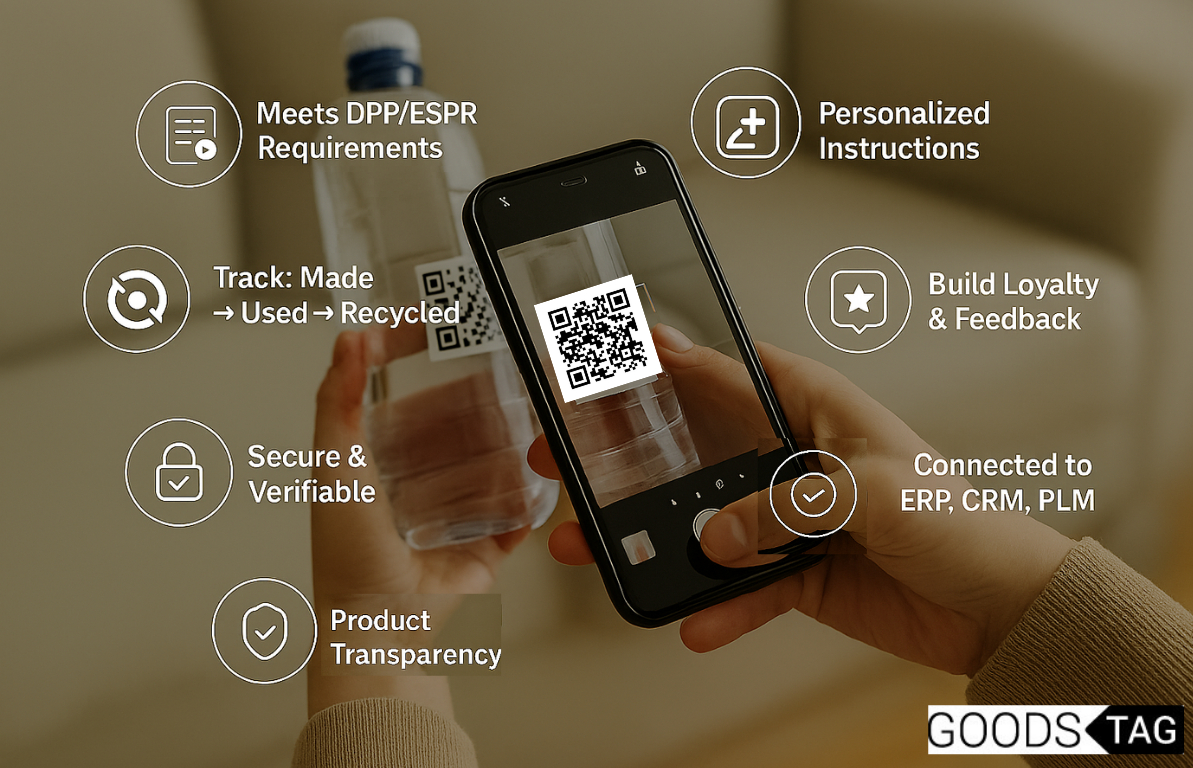Compliance as Both Challenge and Opportunity
Europe’s regulatory landscape is shifting rapidly. The Eco-Design for Sustainable Products Regulation (ESPR) and the upcoming Digital Product Passport (DPP) are redefining how companies design, manage, and communicate about their products.
Unlike earlier measures focused on energy efficiency, these rules aim to increase transparency across the entire product lifecycle: from raw materials to end-of-life recycling. Every company that manufactures, imports, or distributes in Europe will be affected.
At GoodsTag, we see compliance not as an obstacle but as an opportunity. Companies that act early can turn regulatory pressure into a competitive edge — strengthening brand trust, unlocking new market opportunities, and preparing for future rules that go far beyond ESPR.
ESPR in a Nutshell
The Eco-Design for Sustainable Products Regulation lays the foundation for Europe’s circular economy. It expands requirements across:
- Durability: Products should last longer
- Repairability: Access to repair information and spare parts
- Recyclability: Materials must be recoverable and reusable
- Resource efficiency: Products must minimize waste and environmental impact
The Role of Digital Product Passports (DPPs)
A Digital Product Passport is a digital twin of a physical product. It serves as a living record that moves with the product throughout its lifecycle. Unlike static labels, DPPs provide real-time, reliable data such as:
- Materials and origin
- Compliance certifications
- Repair and recycling instructions
- Sustainability metrics
- Lifecycle events (manufacture, transport, resale, end-of-life)
The EU is phasing in DPPs starting with textiles, electronics, and packaging by 2025, followed by batteries in 2026, with more sectors to come.
Why Companies Struggle with Compliance
- Product data is often scattered across suppliers, ERP systems, and spreadsheets
- Regulations evolve quickly, making deadlines uncertain
- Large customers and partners are demanding more transparency
- Non-compliance risks include fines, contract losses, and restricted market access
The challenge is real, but companies that embrace digital product identities now will be better positioned to adapt to future rules.
GoodsTag’s Approach: Making Compliance Work
Our Smart Products Platform-as-a-Service helps companies of all sizes digitize their product information efficiently and in line with global standards. Key benefits include:
- Seamless Data Integration: Connects with ERP, PLM, and supply chain systems via open APIs
- GS1 Digital Link Standard: Ensures product data is interoperable across industries and countries
- Role-Based, Dynamic Content: Consumers, regulators, and recyclers each access the data they need from one code
- Real-Time Compliance Updates: Automated monitoring to keep passports aligned with changing regulations
- Circularity Metrics: Track recycled content, repairability, and sustainability KPIs
Compliance Roadmap for Companies
Compliance does not have to happen all at once. A staged approach works best:
- Secure Product Data: Assign digital IDs and complete product profiles
- Enable Traceability: Use QR, NFC, or RFID tags to update digital twins across the lifecycle
- Align with Timelines: Map deadlines for your sector and region
- Adopt Dynamic Systems: Move away from static spreadsheets to cloud-based, real-time tools
A Call to Companies: Act Now to Lead Tomorrow
The 2025 deadline is near. Waiting risks rushed implementation, higher costs, and lost opportunities.
More importantly, investing in Digital Product Passports today does more than meet ESPR requirements. It creates a foundation for broader compliance worldwide:
- In Europe: future Green Deal regulations such as the Packaging and Packaging Waste Regulation (PPWR) and the Emissions Trading System (ETS)
- In the US: the Inflation Reduction Act (IRA) and Californian plastic regulations
- Globally: emerging sustainability and product compliance frameworks in China, India, and other key markets
By digitizing products now, companies position themselves to meet current and future rules, while building stronger customer trust and gaining an advantage in global markets.
At GoodsTag, we enable companies to transform compliance into growth. By adopting GS1-standard DPPs, businesses can simplify regulation, enhance transparency, and prepare for the next wave of sustainability requirements.
👉 Learn more about how GoodsTag supports ESPR, PPWR, and global compliance at www.goodstag.com
About GoodsTag (a brand of todo GmbH)
GoodsTag delivers cutting-edge digital solutions that empower companies to navigate digital transformation and regulatory compliance with confidence. With a strong focus on transparency, traceability, and customer engagement, GoodsTag enables organizations to unlock new value through technology.
© 2025 GoodsTag. All rights reserved. GoodsTag and the GoodsTag logo are trademarks or registered trademarks of todo GmbH in Germany and other jurisdictions. All other product and company names are trademarks or registered trademarks of their respective owners.
For more information, schedule a demo or visit our website at www.goodstag.com, or contact us at info@goodstag.com to discover how our platform can enhance your compliance strategy.
Follow us on LinkedIn for updates on this collaboration and future innovations.




